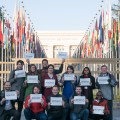Writing History in Geneva
Cleo Verkuijl | February 24, 2015.
With the tumultuous Lima talks barely a thing of the past, representatives from 195 countries gathered earlier this month, once again, to discuss everything from adaptation to zero emissions in preparation for COP21, the major climate change summit taking place at the end of this year in Paris.
Negotiations were set in the monumental Palais de Nations in Geneva: a building with a heavy legacy. Purpose-built for the historical League of Nations, it became the home of the United Nations in 1946 after the League tragically failed in its main objective of preventing a second world war.
But the climate talks started on an exceptionally good note as many negotiating groups, particularly those from the global south, forwent the making of opening statements in the interest of time efficiency.
A cooperative “Geneva spirit” seemingly infused the talks more than anticipated. Productive talks were held on pre-2020 ambition and by Tuesday evening, delegates had concluded most of the work on a draft Paris text that they had set out to do over the course of a week.
New ideas on mitigation, adaptation and finance amongst others were included in the elements text that had last been discussed in Lima, eventually giving rise to a draft global climate agreement, or the aptly named “Geneva text”.
This new document will serve as a basis for substantive negotiations going forward but first its hefty contents – 86 pages – need to be substantially cut down. Reflecting the views of all countries, its contents range from business-as-usual to visionary.
The storm clouds ahead
Some of the most contentious issues that countries will need to settle include:
- Differentiation: Will the Framework Convention on Climate Change’s (UNFCCC) original language on differentiation between the responsibilities of developing and developed countries be retained, or changed to reflect different and evolving national circumstances, as developed countries are advocating?
- Long-term goal: Considered by Christiana Figueres, UNFCCC Executive Secretary, as one of the most important lines of the agreement, countries have to settle whether or not there should be a year for greenhouse gas emissions to peak, and on a goal for fossil fuel phase-out. The NGO community ask of complete decarbonisation by 2050 is theoretically still on the table, though strongly opposed by certain oil-producing and dependent countries.
- Finance: A real dealmaker/breaker. How much will developed countries be willing to give – and how little will poorer countries be willing to accept? A crucial question is also where the money will come from, with proposals ranging from primarily public funding to mostly private and innovative sources.
- Adaptation: Will adaptation be given greater prominence as desired by developing countries? Many have proposed the adoption of a global goal for adaptation.
- Loss and damage: Vulnerable countries are pushing hard to have loss and damage due to climate change addressed in the Paris text; developed countries fear associated costs and want to keep it out.
- Markets: Countries need to decide if market mechanisms have a global role to play in emissions reductions by allowing countries and companies to pay to offset their emissions in other parts of the world. Bolivia and some other anti-capitalist countries are opposed saying unfettered markets brought us the climate crisis in the first place.
- Aviation and maritime emissions: Will parties agree on the need to set emission reduction targets for these fast-growing industries?
Although numerous countries in Geneva expressed a willingness to start eliminating repetitive text to begin negotiations on substance as soon as possible, there was disagreement about how this should be done. Previous instances where this facilitative role has been delegated to the co-chairs has resulted in divisiveness, but leaving it in the hands of 195 countries is not necessarily any better.
Consequently, many hours of confusion and incertitude followed, and those looking to the new co-chairs of the Paris process, Ahmed Djoghlaf (Algeria) and Daniel Reifsnyder (United States) to provide strong guidance were left disappointed.
Having underlined their commitment to “openness, transparency, inclusiveness and fairness” and a “no surprises” policy, the new co-chairs seem reluctant to impose any decisions on countries in the interest of expediency. “No-one will say that this text is not your text” they told countries.
The co-chairs seem wary of jeopardising the party-driven nature of the climate process, a mistake that some have accused their predecessors of making, and eventually decided to postpone streamlining of the Geneva text until June.
Many felt this was an unambitious use of Geneva’s negotiating time and parties as diverse as Venezuela, Russia and the European Union expressed strong frustration to this effect. Civil society, too, commented that the talks may have become “a victim of their own success”.
The overall tone of the closing was nevertheless positive: the foundations were laid in Geneva for a new agreement in Paris, and seemingly sincere discussions were held on implementing pre-2020 climate action. During the closing plenary, 18 countries also launched an informal initiative for sharing best practices on climate and human rights.
The historic setting of the home to the fallen League of Nations should serve as an important reminder that good intentions are not enough to prevent very bad things from happening.
Courage and leadership are needed to make the difficult decisions necessary to ensure a liveable future. Building on the constructive parts of the Geneva text, countries now need to ensure a robust international framework that responds to global realities and goes beyond narrow and short-term national interests.
Delegates will next meet in Bonn, Germany this June. Apply to be part of The Verb’s coverage.













comment